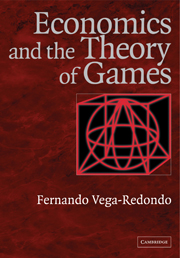Book contents
- Frontmatter
- Contents
- Preface
- 1 Theoretical framework
- 2 Strategic-form analysis: theory
- 3 Strategic-form analysis: applications
- 4 Refinements of Nash equilibrium: theory
- 5 Refinements of Nash equilibrium: applications
- 6 Incomplete information: theory
- 7 Incomplete information: applications
- 8 Repeated interaction: theory
- 9 Repeated interaction: applications
- 10 Evolution and rationality
- 11 Learning to play
- 12 Social learning and equilibrium selection
- Bibliography
- Index
10 - Evolution and rationality
Published online by Cambridge University Press: 03 June 2010
- Frontmatter
- Contents
- Preface
- 1 Theoretical framework
- 2 Strategic-form analysis: theory
- 3 Strategic-form analysis: applications
- 4 Refinements of Nash equilibrium: theory
- 5 Refinements of Nash equilibrium: applications
- 6 Incomplete information: theory
- 7 Incomplete information: applications
- 8 Repeated interaction: theory
- 9 Repeated interaction: applications
- 10 Evolution and rationality
- 11 Learning to play
- 12 Social learning and equilibrium selection
- Bibliography
- Index
Summary
Introduction
So far in this book, we have implicitly assumed that players experience no cognitive limitations when confronting strategic situations. Consequently, any considerations pertaining to whether and how agents will be able to arrive at some optimal (or equilibrium) strategy have been fully abstracted from. It is clear, however, that a coherent and exhaustive analysis of some games can be exceedingly difficult. And this, of course, not only concerns many of our idealized theoretical contexts but is also much more applicable to the strategic interactions taking place in the real world. In many real contexts, players can seldom hope to understand the underlying game in a transparent manner, which in turn leads them to resorting to relatively simple rules to shape their behavior. But then, one expects that players should adjust over time their decision rules on the basis of their own and others' experience, those rules that are more effective tending to spread throughout the population in lieu of less successful ones.
From a theoretical viewpoint, the former considerations raise two related questions:
What reasonable features should be postulated on the dynamics of behavioral adjustment?
Under what conditions does the entailed adjustment dynamics converge to some optimal or equilibrium pattern of play?
The study of these important issues will attract much of our attention through the remainder of this book, not only here but also in the two subsequent chapters.
- Type
- Chapter
- Information
- Economics and the Theory of Games , pp. 355 - 397Publisher: Cambridge University PressPrint publication year: 2003
- 1
- Cited by



